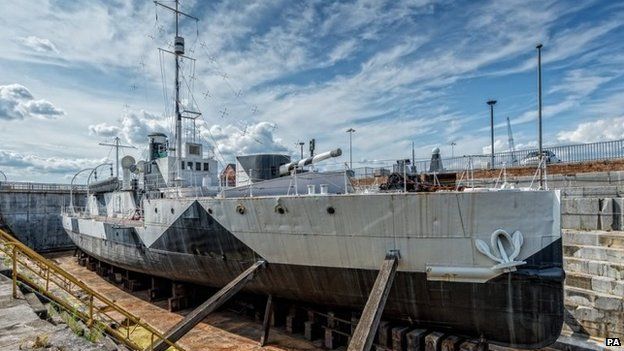Last WW1 Gallipoli ship HMS M33 to open to public
- Published

The only surviving ship from the World War One Gallipoli campaign is to be restored and opened to the public with the help of a £1.75m lottery grant.
Monitor ship HMS M33 sits in number one dock next to HMS Victory, in Portsmouth Historic Dockyard.
The £2.4m restoration will be paid for by the Heritage Lottery Fund (HLF) and a Hampshire County Council grant to the National Museum of the Royal Navy.
It is hoped to be complete for next year's centenary commemorations.
Project director Matthew Sheldon said: "HMS M33 is a small ship but has a big history.
"Finally, we'll be able to share the story of her part in the Gallipoli Campaign, and reveal what it was like for the 72 crew who were crammed on board."
The 568-tonne, M29-class monitor has a shallow hull, which allowed it to get closer to shore to fire at land targets.
More than 100,000 lives were lost in the Gallipoli campaign between April 1915 and January 1916.
After the war, the M33 returned to action in the Russian Civil War, where it was involved in the withdrawal of troops from northern Russia during the Dvina River Campaign, which took place between 1918 and 19.
It spent the remainder of its active service in Portsmouth, where it remains.
Museum director Prof Dominic Tweddle said: "We are delighted that the Heritage Lottery Fund has made this grant to the National Museum of the Royal Navy to conserve and restore the ship - she will be a permanent commemoration and a reminder that the First World War took place at sea just as much as on land."
When complete, visitors will enter the ship through a new entrance where there will be an "immersive" battle experience bringing to life the ship's history as well as the history of the Gallipoli campaign.
HLF chief executive Carole Souter said: "The role of the Royal Navy in the First World War deserves to be much better known.
"Now, thanks to lottery money, visitors to M33 will be able to the learn more about the crucial part it played during the war, particularly at Gallipoli, alongside experiencing first-hand something of the conditions in which sailors lived and fought."
- Published21 September 2014
- Published12 June 2014
- Published1 March 2014